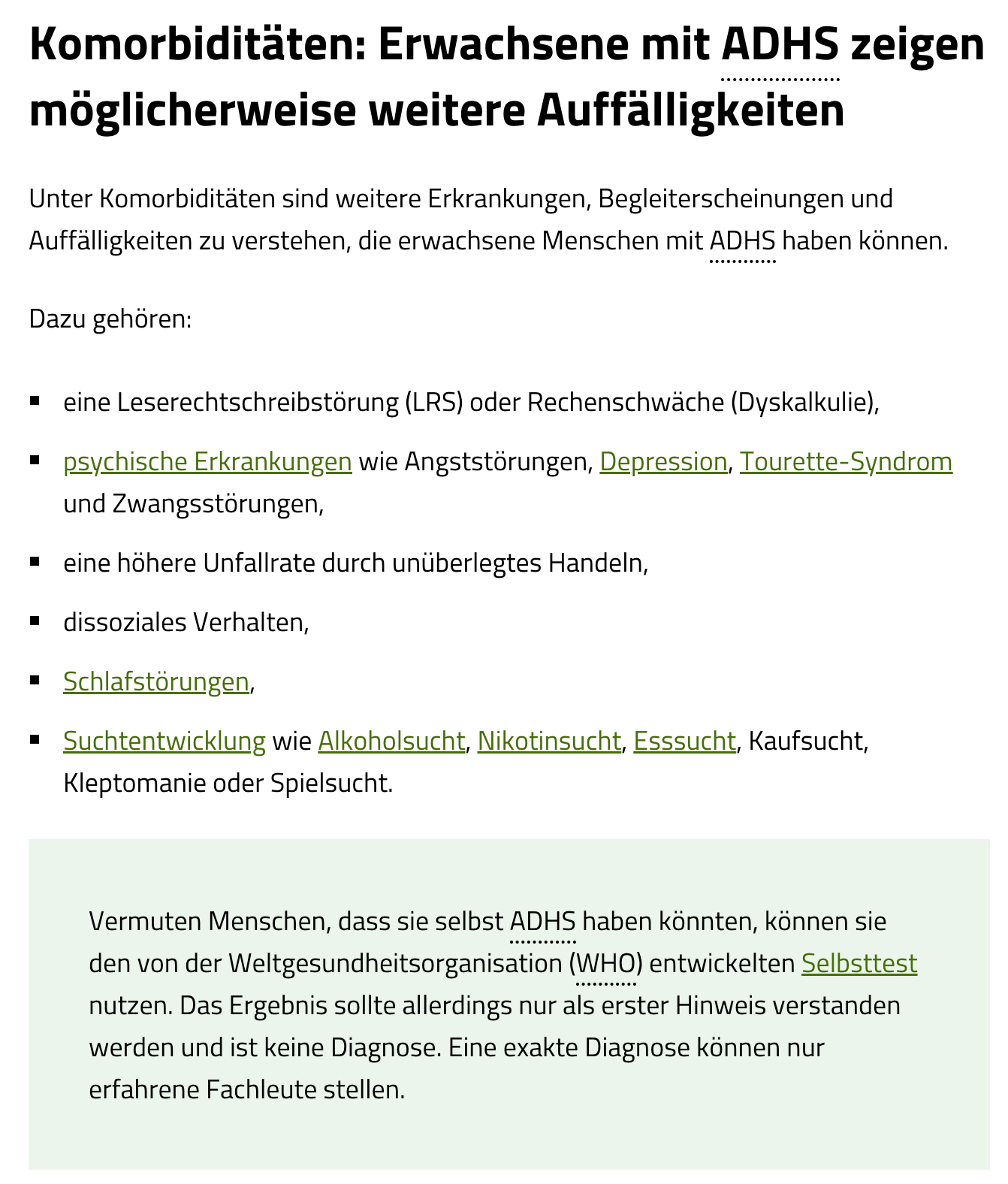Das passende Foto aus dem Artikel auf rp-online.de vom 24.5.24 bringe ich lieber nicht (Urheberrecht und Abmahnungen). Es ist nicht im Keller aufgenommen.
»Bundesgesundheitsminister Karl Lauterbach will rasch für strengere Regeln sorgen, um den Verkauf von Lachgas als Partydroge besonders an junge Leute einzudämmen. „Wir werden schnell mit einer Regelung kommen“, sagte der SPD-Politiker am Freitag im ARD-„Morgenmagazin“. Als eine Möglichkeit nannte er den Vorschlag aus Niedersachsen, Lachgas in die Liste von psychoaktiven Stoffen aufzunehmen, mit dann sehr strengen Regeln für den Verkauf. „Wir gehen das jetzt sehr schnell an“, versicherte der Minister…«
Auf der Seite der BARMER Versicherung ist über ADHS bei Erwachsenen zu erfahren:
Es wäre diskriminierend, derart erkrankte Menschen in einen Topf mit Karl Lauterbach zu werfen. Falsch wäre es, politische Entscheidungen zu pathologisieren. Wenn aber jeder einzelne Spiegelstrich anscheinend auf den Minister zutrifft, dann gibt es Anlaß zu Besorgnis. Allerdings ist zu erwarten, daß die politische und mediale Blase, in der auf allen Gebieten der Trend zu Irrationalität und PHEIC-News herrscht, in Lauterbach einen der Ihren und sein Verhalten als das von ihr als "normal" Definierte ansieht.


"PLOS One has published a study noting that the spread of COVID-related and other misinformation on social media varies by topic and by country in Europe.
The study was conducted by analyzing news activity on Twitter (now X) in France, Germany, Italy and the United Kingdom from 2019 to 2021, noting misinformation on major news topics including Brexit, coronavirus, and COVID-19 vaccines.
News sources cited were rated as either "reliable" or "questionable" based on their NewsGuard scores, which measure nine journalistic criteria, assigning outlets a reliability score out of 100.
Rate of questionable news highest in German
The authors found the United Kingdom maintained a relatively stable proportion between questionable and reliable retweets across different topics. Germany, on the other hand, had the highest ratio of questionable news retweets on each of the three topics analyzed, followed by France.
"Our findings indicated that reliable sources dominate the information landscape, but users consuming content mainly or exclusively from questionable news outlets were often present," the authors concluded.
The authors also said monitoring news consumption by country rather than continental region would be useful for any efforts looking to combat misinformation.
Monitoring the information landscape at both national and European levels is indeed crucial to understanding the state of public discourse on contentious topics.
"Monitoring the information landscape at both national and European levels is indeed crucial to understanding the state of public discourse on contentious topics and detecting the emergence of new and divisive narratives within the European context," they said."
https://www.cidrap.umn.edu/covid-19/covid-other-misinformation-varies-topic-country-social-media
Sofern man es nicht besser wüsste, würde man auf exzessiven Lachgaskonsum bei sogenannten Kabinettssitzungen schließen, wenn man sich die gesamte sogenannte Politik näher ansieht. Auch die "Opposition" nascht ausgiebig vom Lachgas. Leider sind die Ergebnisse dieses wahrscheinlichen Missbrauchs nicht lachhaft.
Es gibt selbstverständlich aus Abschreckungsmaßnahmen: Auf die Lachgaspackung einfach ein Bilder der Mitglieder der "Regierung" und der "Opposition" aufbringen. Als Mahner selbstverständlich, nicht als Opfer.
https://digitalcourage.de/blog/2024/petition-fuer-recht-auf-ein-leben-ohne-digitalzwang-gestartet
Tolles Foto! Sich das anzusehen lohnt. Ich nehm kein Lachgas!
"Als eine Möglichkeit nannte er den Vorschlag aus Niedersachsen, Lachgas in die Liste von psychoaktiven Stoffen aufzunehmen, mit dann sehr strengen Regeln für den Verkauf."
Sprühsahne dann nur noch gegen BTM-Rezept!